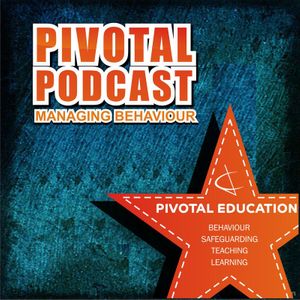How to help young people be all that they can be with Joe Baldwin – PP164
Pivotal Podcast - A podcast by Pivotal Education

Categories:
Joe is Director of Learner Services at Bridgend College. After realising that Primary teaching wasn’t for him, he did some work experience as a teaching assistant in an FE college, working with learners with complex needs and emotional and behavioural difficulties. He loved this work so decided to do a PGCE. After projects with young people with autism, he moved to Wales to join the team at Bridgend FE College. How might a young person with additional needs find the FE environment particularly challenging? Joe thinks that the structure and operation of FE colleges are so different to schools that it can cause issues. For example, a lot of FE colleges cannot offer a 5-day provision and the timetable is looser than in a school. There won’t be a school bell or a uniform and teachers aren’t addressed as Mr., Mrs., Sir or madam. It’s essentially becoming an adult with all the challenges that presents to young people. There’s also a perception that the support for young people in FE college won’t be as personal as at a school. Joe works with staff, parents and carers to dispel this myth and ensure these young people receive the care and attention they need. How do you work with parents in an FE setting? Joe says that the biggest difference is in how they build relationships with parents and carers. They take time to understand what they need and make sure there is a face and a name of someone they can contact. Joe has been involved in * parent/carer forums * going out to coffee mornings in local schools * providing information which is accessible He is particularly keen on the use of technology and produced a virtual, 360 degree tour of the college campus so that prospective parents and students could begin to explore the environment from home. What does an inclusion-focused college look like? Joe’s college mission statement is: ‘Be All That You Can Be’. What that looks like is different for all of us. Inclusion is how the college responds to the students’ prior achievement, how it looks at programmes which are fully inclusive and allow learners to work at t level which is appropriate for them. That will be different in maths to an independent living qualification and you need to start with the person, rather than the subject. Then you can work back to define what provision will help them to meet their needs and to progress. As a result, Joe is cautious about how he uses transition information and tries not to let it govern the way provision is designed. What needs to be done to ensure no learner arrives in FE without the support they need being in place? Joe believes that early intervention is crucial. It’s vital to build relationships with learners, parents and feeder schools as early as possible and to help you ensure you have the skills and knowledge necessary to support new learners in your staff before its needed. The curriculum offering also needs to be fluid and responsive to the needs of the individuals you are catering for. It’s also important to consider what other services might be needed – for example in the ‘third sector’ (voluntary sector). It’s essential that everyone involved understands their role in supporting the young person. There is a huge amount more detail and examples in the episode so do listen right to the end! Jo on Twitter – @JosephBaldwin